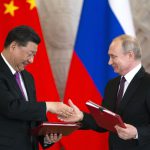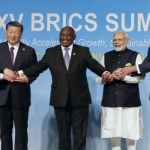Friday, Nov 23, 2018 14:17 Hrs GMT | Chinese Consulate Attacked in Karachi, Pakistan
KARACHI, Pakistan (AP) — Armed separatists stormed the Chinese Consulate in Pakistan’s southern port city of Karachi on Friday, triggering an intense hour-long shootout during which two Pakistani civilians, two police officers and all three assailants were killed, Pakistani officials said.
The killed Pakistani civilians were a father and a son who had come to the consulate to pick up their visas to China, police said.
The brazen assault, claimed by a militant group from the southwestern province of Baluchistan, reflected the separatists’ attempt to strike at the heart of Pakistan’s close ties with major ally China, which has invested heavily into road and transportation projects in the country, including in Baluchistan.
All the Chinese diplomats and staff at the consulate were safe and were not harmed during the attack or the shootout, senior police official Ameer Ahmad Sheikh said. They were evacuated from the area shortly after and taken to a safe place.
Following the attack, China asked Pakistan to beef up security at the mission. In Beijing, Foreign Ministry spokesman Geng Shuang said that China would not waver in its latest big project in Pakistan — the China-Pakistan Economic Corridor — and expressed confidence that Pakistan could ensure security.
Pakistani officials say three gunmen who stormed the Chinese Consulate in Karachi are dead. Cellphone video of CCTV footage shows three men approaching the consulate carrying Kalashnikovs. Two Pakistani guards and two civilians were also killed.
Pakistan’s Foreign Minister Shah Mahmood Qureshi spoke to his Chinese counterpart Wang Yi by phone and assured him that a “thorough investigation will be carried out to apprehend the perpetrators their financiers, planners and facilitators” linked to the attack on consulate, according to a foreign ministry statement.
Pakistani Prime Minister Imran Khan also condemned the attack, describing it as part of a conspiracy against Pakistan and China’s economic and strategic cooperation. Khan lauded the Karachi police and the paramilitary rangers, saying they showed exceptional courage in defending the consulate and that the “nation salutes the martyrs.”
He also ordered an investigation and vowed that such incidents would never be able to undermine relations with China, which are “mightier than the Himalayas and deeper than the Arabian Sea.”
The attackers stormed the consulate shortly after 9 a.m., during business hours. They first opened fire at consulate guards and hurled grenades, then managed to breach the main gate and enter the building, said Mohammad Ashfaq, a local police chief.
Pakistani security forces quickly surrounded the area. Local TV stations broadcast images showing smoke rising from the building, which also serves as the residence of Chinese diplomats and other staff.
The shootout lasted for about an hour.
Dr Seemi Jamali, a spokeswoman at the Jinnah Hospital, said a consulate guard was also wounded in the attack and was being treated at the hospital.
Geng, the Chinese spokesman, said the attackers didn’t manage to get into the consulate itself, and that the exchange of fire took place outside the building. The discrepancy with the Pakistani officials’ reports could not be immediately reconciled.
Elsewhere in Pakistan on Friday, a powerful bomb at an open-air food market in the Orakzai region of the Khyber Pukhtunkhwa province, which borders Afghanistan, killed 35 people and wounded dozens of others, said police official Tahir Ali.
Most of the victims in the attack in the town of Klaya were minority Shiite Muslims. No one immediately claimed responsibility for the bombing. Orakzai has been the scene of several militant attacks in recent years, mostly by Pakistani Sunni militants, who revile Shiites as apostates.
In its claim of responsibility for the Karachi attack, the Baluch Liberation Army said it was fighting “Chinese occupation” and released photos of the three attackers.
In August, a suicide bomber rammed into a bus ferrying Chinese workers to the Saindak mining project in southwestern Baluchistan, wounding five workers. The project is controlled by the Chinese state-owned Metallurgical Corporation of China. And in May, gunmen opened fire on two Chinese nationals in Karachi, killing one and wounding the other.
So far this year, the Baluch Liberation Army has claimed responsibility for 12 attacks against security personnel guarding projects linked to the so-called Chinese Pakistan Economic Corridor as well as to the infrastructure.
China is a longtime ally and has invested heavily in transport projects in Pakistan. The two countries have strengthened ties in recent years and China is currently building a network of roads and power plants under a project known as the China-Pakistan Economic Corridor, or CPEC.
Newsroom | theworldmail.co.uk
News Source/Photo by Associated Press






